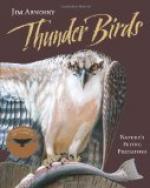The judge had a boy of his own, and it seemed to him that Johnny needed time to think, and to recover from his sulks. Six days, in his opinion, would be about right. The first two would be spent in revilings; the third and fourth in realizing that he had only himself to blame for his predicament, and the fifth and sixth days would stretch themselves out like months and he would come out a considerably chastened young man.
Another thing Johnny did not know was that, thanks to Mary V’s father, he was not herded with the other prisoners, where the air was bad and the company was worse. He went back to his room under the roof, where the jailer presently visited him and brought fruit and magazines and a great box of candy, sent by Mary V with a doleful little note of good-by as tragic as though he were going to be hanged.
Johnny was sulkier than ever, but his stomach ached from fasting. He ate the fruit and the candy and gloomed in comparative comfort for the rest of that day.
The next day, when the jailer invited him down into the jail yard for a half hour or so, Johnny experienced a fresh shock. Somewhere, high in the air, he heard the droning hum of his airplane. Bland was not neglecting the opportunity Johnny had inadvertently given him, then.
Johnny craned his neck, but he could not see the plane in the patch of sky visible from the yard. He listened, and fancied the sound was diminishing with the distance. Bland was probably leaving the country, though Johnny could not quite understand how Bland had managed to get the funds for a trip. Perhaps he had taken up a passenger or two—or if not that, Bland undoubtedly had ways of raising money unknown to the honest.
Oh, well, what did it matter? What did anything matter? All the world was against John Ivan Jewel, and one treachery more or less could not alter greatly the black total. Not one friendly face had he seen in the police court—since he did not call the reporters friendly. Mary V had not been there, as he had half expected; nor Sudden, as he had feared. The sheriff had not been friendly, in spite of his chuckle. Bland had not shown up—the pop-eyed little sneak!—probably because he had already planned this treachery.
He went back to his lonely room too utterly depressed to think. Apathetically he read the paper which his jailer brought him along with the tobacco which Johnny had sent for. Smoke was a dreary comfort—the paper was not. The reporters had lost interest in him. Whereas two columns had been given to his personal affairs the day before, his troubles to-day had been dismissed with a couple of paragraphs. They told him, however, that the “irate father” had taken the weeping maiden out of town and left the “truculent young birdman pining in captivity.” It was a sordid end to a most romantic exploit, declared the paper. And in that Johnny agreed. He could not quite visualize Mary V as a weeping maiden, unless she had wept tears of anger. But the fact that her irate father had taken her away without a word to him seemed to Johnny a silent notice served upon him that he was to be banished definitely and forever from her life. So be it, he told himself proudly. They need not think that he would ever attempt to break down the barrier again. He would bide his time. And perhaps some day—




